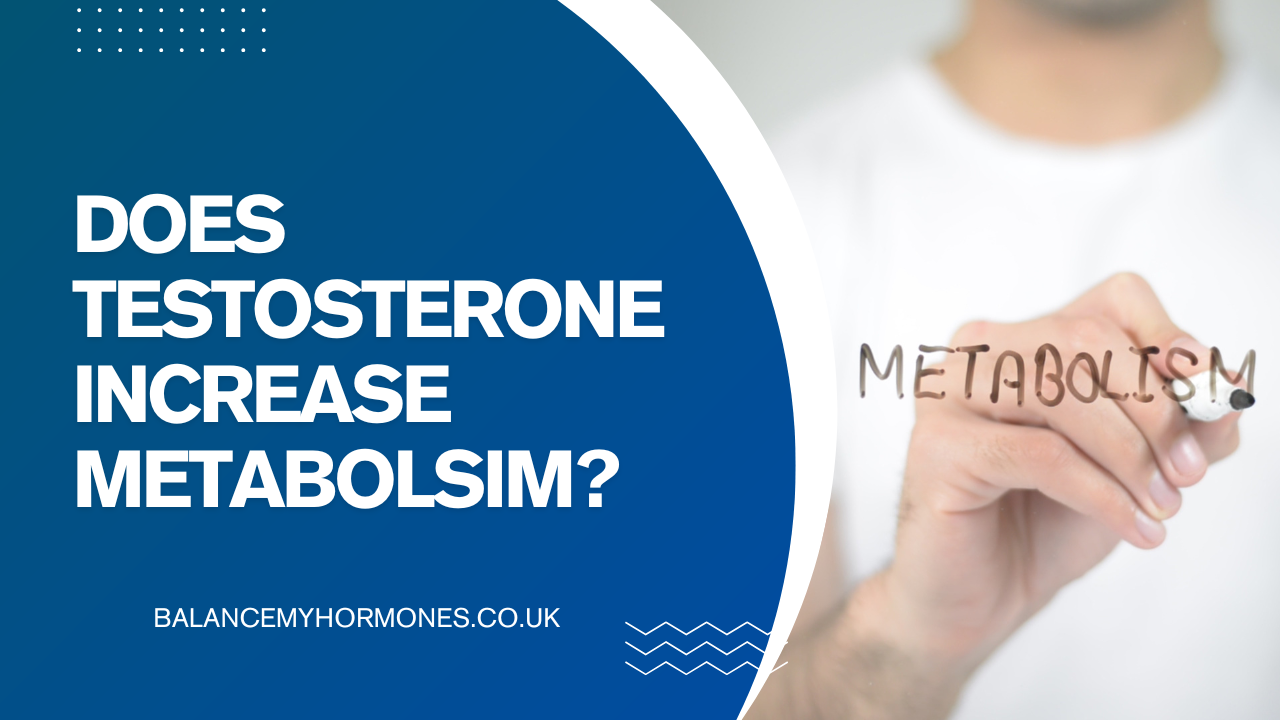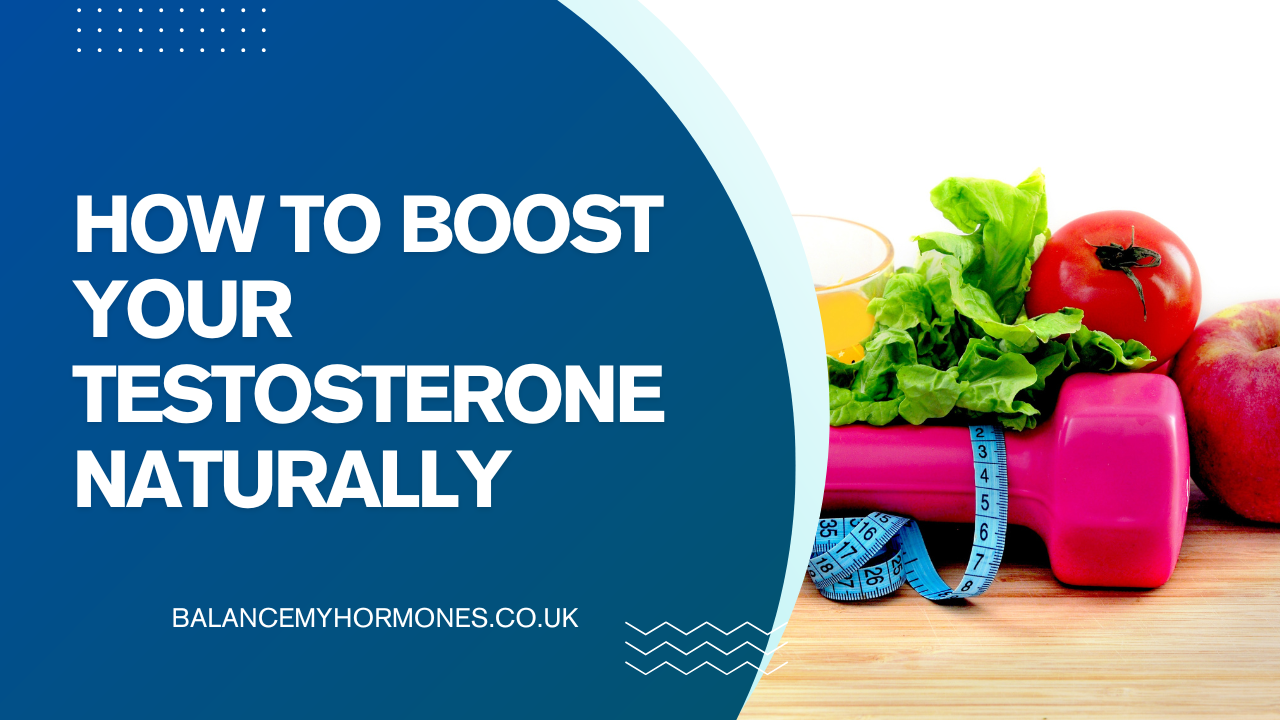
By Mike Kocsis | 7 minutes read | Last updated: October 15, 2025 Categories: Testosterone
Medically Reviewed by Dr. George Touliatos
Does testosterone increase metabolism? This simple question has gained a lot of attention from scientists, fitness enthusiasts and people interested in weight loss.
Studies show that testosterone is involved in various body processes, including metabolism, body fat composition and muscle growth.
Let’s understand the role of testosterone in boosting metabolism and see how you can optimise your hormone levels to unlock your body’s fat-burning potential.
How does testosterone affect metabolism?
Testosterone is an important hormone required for metabolism. It affects the metabolism of carbohydrates, fats and cholesterol and also promotes an increase in muscle mass.
Compared to fat tissues, muscle tissues are metabolically more active which means they consume more energy.
Testosterone helps increase and maintain muscle mass. In this way, it also elevates the body’s basal metabolic rate (BMR). Therefore, individuals with higher testosterone levels generally have a higher BMR which allows them to burn more energy even at rest.
The hormone achieves this through its anabolic effects, which involve the increased amino acid uptake and protein synthesis in muscle tissues.
Testosterone binds to androgen receptors on muscles, signalling them to increase the rate at which they produce muscle protein. This not only helps build new muscle fibres but also repairs existing ones. In this way, it helps maintain a leaner body composition with less fat.
Testosterone’s role in muscle development
Testosterone is well-known for its role in muscle development, which is why many bodybuilders take it to increase their lean muscle mass and strength in a short time span.
Testosterone does this by supporting muscle protein synthesis and inhibiting muscle protein degradation. This dual effect contributes to muscle hypertrophy (the increase in muscle size) and hyperplasia (the formation of new muscle cells).
The hormone is also involved in repairing muscle fibres after exercise. In this way it facilitates quicker recovery and increased muscle size over time.
Moreover, testosterone increases the secretion of growth hormone (GH), which synergises with it to further enhance muscle development. GH stimulates the liver to produce IGF-1 (insulin-like growth factor 1), another anabolic hormone that promotes muscle growth and regeneration.
Effect of testosterone on basal metabolic rate (BMR)
Testosterone’s impact on the basal metabolic rate (BMR) is largely due to its muscle-building effects.
As mentioned earlier, muscle tissues are more active and they require more calories for maintenance compared to fat tissue. By increasing muscle mass, testosterone naturally increases BMR, allowing the body to burn more calories at rest.
This higher metabolic rate helps in reducing fat accumulation and maintaining a lean body, which is essential for overall metabolic health.
Research indicates that men with higher testosterone levels tend to have a higher BMR, which contributes to easier weight management and a lower risk of obesity.
What’s more, elevated BMR associated with increased muscle mass due to testosterone can also improve glucose metabolism. This effect further supports testosterone’s role in preventing metabolic syndrome.
Testosterone and body fat percentage
Testosterone has a significant impact on body fat distribution and overall body fat percentage. It promotes leaner body mass by supporting muscle growth while simultaneously influencing fat distribution patterns.
In men, higher testosterone levels are often associated with lower body fat percentages. This is because testosterone inhibits the creation of new fat cells and encourages the body to use fat as a source of energy.
Additionally, it also affects the level of lipoprotein lipase, an enzyme required for fat storage. Testosterone decreases the enzyme’s activity in areas like the abdomen which results in less fat being stored in this central area.
On the other hand, low testosterone levels in men can lead to increased body fat, especially visceral fat, which is metabolically active and affects insulin resistance.
Testosterone’s role in fat metabolism
Testosterone increases fat metabolism through several mechanisms.
It binds to androgen receptors in fat tissues and stimulates the breakdown of fats (lipolysis) into simpler compounds that the body can use for energy. In this way, it not only helps in reducing fats but also in maintaining a healthy weight.
As discussed earlier, testosterone’s effect on fat metabolism is also somewhat due to its ability to increase muscle mass.
Also, testosterone controls several signalling pathways that influence fat cell metabolism, including the regulation of genes involved in fat oxidation.
Through these complex interactions, testosterone shapes body composition by regulating fat distribution and metabolism.
How testosterone levels change over the lifespan
Testosterone levels change throughout a person’s life whether they are man or woman. And these changes impact metabolic rate as well.
In men, testosterone levels are the highest during adolescence and early adulthood. That is why teenage boys experience a noticeable change in muscle mass strength, facial hair growth and voice.
After this peak, testosterone levels gradually decline at a rate of about 1% per year beginning around the age of 30. This decline is even more prominent in men with poor lifestyle and chronic health conditions like obesity and type 2 diabetes.
Compared to men, women have much lower testosterone levels. But testosterone is still very important for their muscle strength and lean body mass.
Women experience a more abrupt decline in testosterone during perimenopause and postmenopause. It often contributes to low muscle mass and a consequent reduction in metabolic rate. This can increase the risk of weight gain and metabolic syndrome in older women.
Effect of low testosterone on metabolic health
The age-related decline in testosterone levels has profound implications for metabolic health. Lower testosterone levels are closely linked with a decrease in metabolic rate, which can lead to increased body fat and obesity risk.
This is particularly evident in older men who experience andropause, a condition similar to menopause in women, characterised by a notable decline in hormonal levels.
This reduction in testosterone levels may also reduce metabolic rate and make older adults more susceptible to metabolic diseases such as type 2 diabetes, cardiovascular disease, and obesity.
Moreover, low testosterone levels are associated with insulin resistance, which further impairs metabolic function.
Managing testosterone levels through healthy lifestyle changes and treatments like testosterone replacement therapy (TRT) may help low T men improve their metabolic health.
How to improve testosterone levels and metabolism
There are various natural and medical ways to boost testosterone levels and metabolism, including:
Lifestyle changes
Lifestyle modifications such as increasing physical activity have been shown to improve testosterone levels and metabolic rate.
Healthy diet
Testosterone boosting foods, foods rich in zinc, such as oysters and other shellfish, beef, and beans, are particularly important for testosterone production. Vitamins D and B, as well as omega-3 fatty acids, also contribute to both testosterone and healthy metabolism levels.
Exercise
Specific types of exercise are more effective at improving testosterone levels. Resistance training, such as weight lifting, is known to have a significant impact on testosterone levels.
Testosterone replacement therapy (TRT)
Testosterone therapy can be an effective solution for men suffering from male hypogonadism. This therapy has been shown to improve muscle mass, reduce fat mass, and improve energy levels in low T men.
However, TRT should only be used under the guidance of a healthcare provider due to potential side effects.
Common misconception about testosterone supplements and metabolism
Some people believe that testosterone supplements can miraculously boost metabolism and cause significant weight loss without any side effects.
However, the reality is that while testosterone can influence metabolic rate, its effects vary among individuals and supplements can have risks.
You should maintain a balanced lifestyle and have proven treatments like TRT, when necessary, for optimal hormonal balance and improved metabolic health.
FAQs about testosterone and metabolism
Does TRT increase metabolism?
Yes, it does. Various small studies show that TRT improves metabolic health in men with testosterone deficiency.
How much does testosterone increase metabolism?
Testosterone can increase metabolism but the exact amount by which it increases metabolism rate varies from person to person based on their hormone levels, testosterone dose, overall health and lifestyle.
Does low testosterone cause weight gain?
Yes, low testosterone can lead to weight gain as testosterone is required for optimal metabolic health, an increase in muscle mass and body fat distribution.
Summing it up
Testosterone plays an important role in maintaining metabolism in both men and women. It does this by supporting muscle protein synthesis and managing body fat percentage.
Adopt healthy lifestyle habits such as exercise, stress management, quality sleep and balanced diet to maintain normal testosterone levels.
Get in touch with us if you have any testosterone replacement therapy related query. Our dedicated professionals are here to guide you through tailored treatment plans to ensure you achieve hormonal balance and reclaim a fulfilling life.
References
Ma, H., Sun, J., Wu, X., Mao, J. and Han, Q., 2024. Percent body fat was negatively correlated with Testosterone levels in male. PLoS One, 19(1), p.e0294567.
Li, S.Y., Zhao, Y.L., Yang, Y.F., Wang, X., Nie, M., Wu, X.Y. and Mao, J.F., 2020. Metabolic effects of testosterone replacement therapy in patients with type 2 diabetes mellitus or metabolic syndrome: A meta‐analysis. International Journal of Endocrinology, 2020(1), p.4732021.
Evidence Based Research
This article has been researched and written based on scientific evidence and fact sheets that have then been crossed checked by our team of doctors and subject matter experts.
References, sources and studies used alongside our own in-house research have been cited below, most of which contain external clickable links to reviewed scientific paper that contain date stamped evidence.
Our team of healthcare experts and GMC registered doctors are licensed to UK GMC standards. We strive to provide you with the latest evidence based, researched articles that are unbiased, honest and provide you with accurate insights, statistics and helpful information on the discussed topic to ensure you gain a better understanding of the subject. You can read more about our Editorial Process by clicking here.
We value your feedback on our articles, if you have a well-researched paper you would like to share with us please contact us.
Quick Low Testosterone Test
If you know your total testosterone reading from a previous blood test input the results to the left above to see if your testosterone levels are normal.
Low Testosterone Levels
You may have low testosterone depending on the symptoms you have, please contact us to find out how we can help.
Please Retry
The Total Testosterone Level You Entered Is Incorrect. Figure Must be in nmol/L you can use our converter here.
Normal Testosterone Levels
Your testosterone levels appear to be in the normal range.
LOOKING GOOD!
You must be over 38, have had your ovaries removed or have suffered with premature menopause to warrant further hormone tests.
Further investigation needed
Please contact us to discuss your hormones, we need your total testosterone levels to validate your hormone deficiency. You can order a blood test here.
Low Testosterone Levels
You may have low testosterone depending on the symptoms you have, please contact us to find out how we can help.
High Testosterone Levels
You appear to have higher than normal testosterone levels, please contact us for further investigation.
Normal Testosterone Levels
You appear to have normal testosterone levels. Contact us if you have any concerns.


 Mike Kocsis has an MBA with a focus on healthcare administration and is an entrepreneur and medical case manager for Balance My Hormones which offers medical services in the UK and Europe. Mike has over 20 years of experience in the healthcare sector, much of that working with people who have hormone imbalances. Mike has appeared on
Mike Kocsis has an MBA with a focus on healthcare administration and is an entrepreneur and medical case manager for Balance My Hormones which offers medical services in the UK and Europe. Mike has over 20 years of experience in the healthcare sector, much of that working with people who have hormone imbalances. Mike has appeared on 

